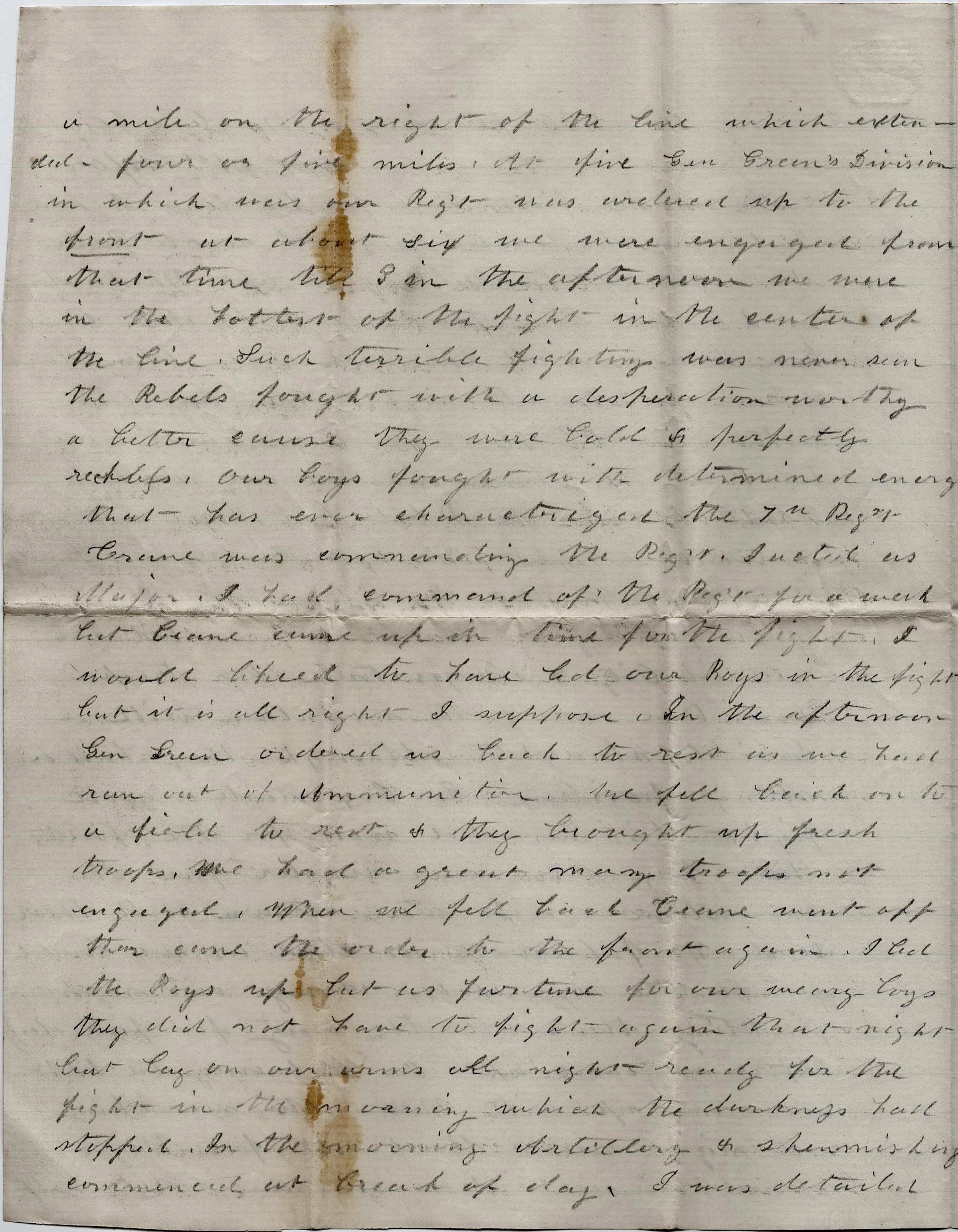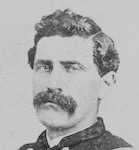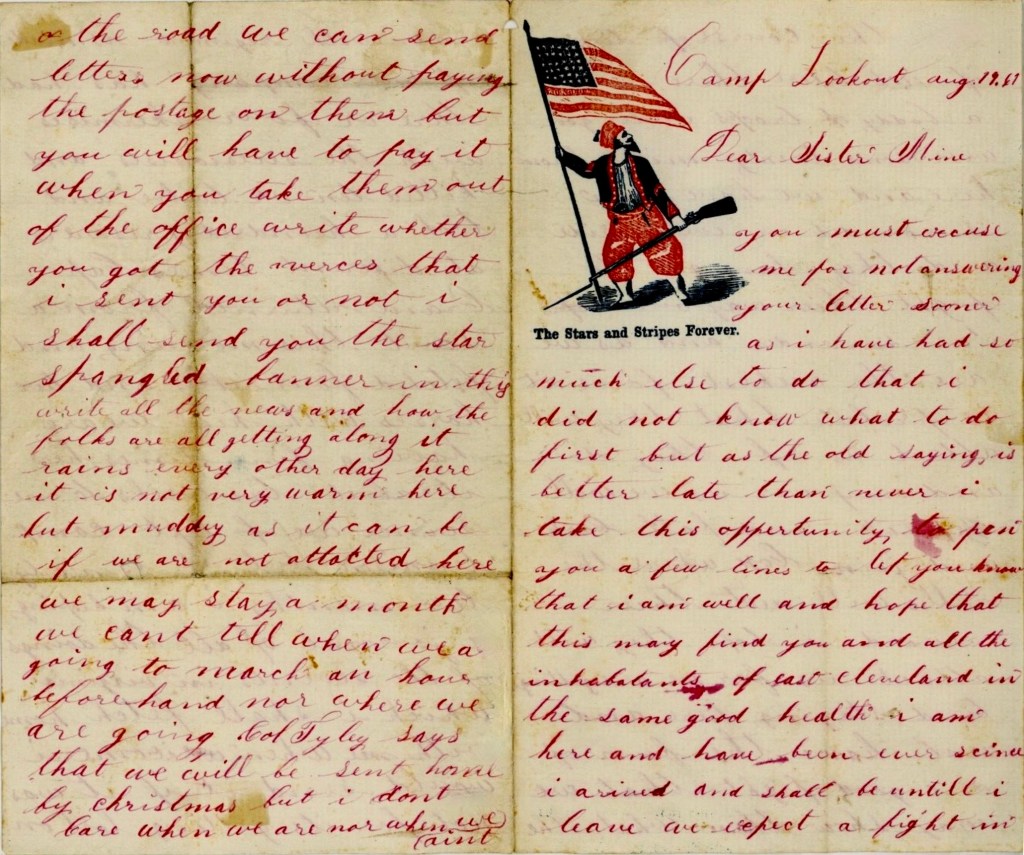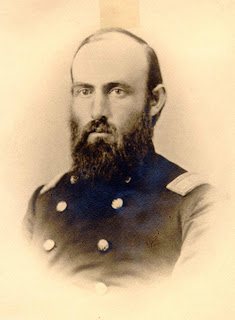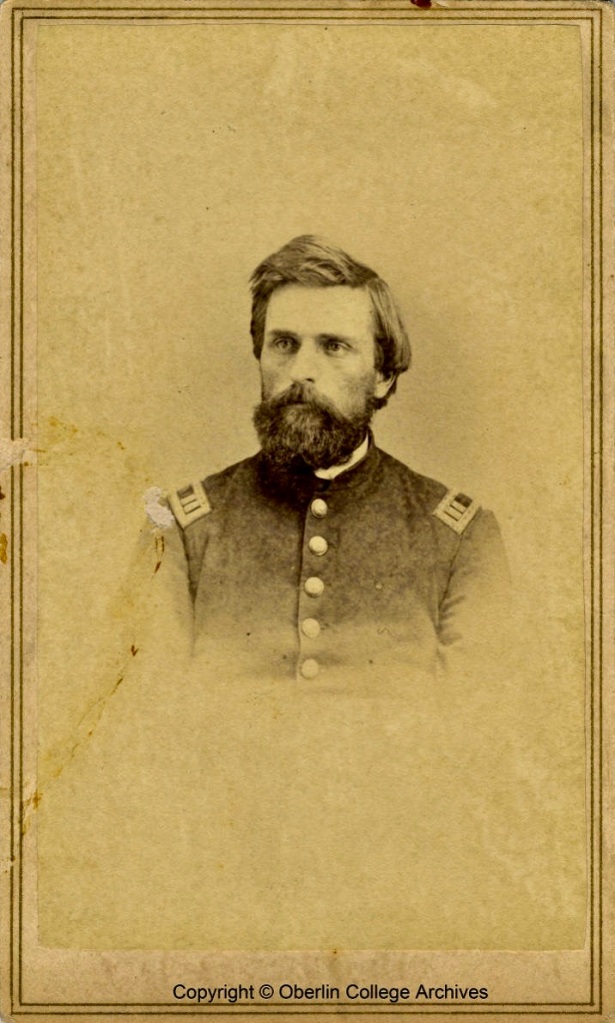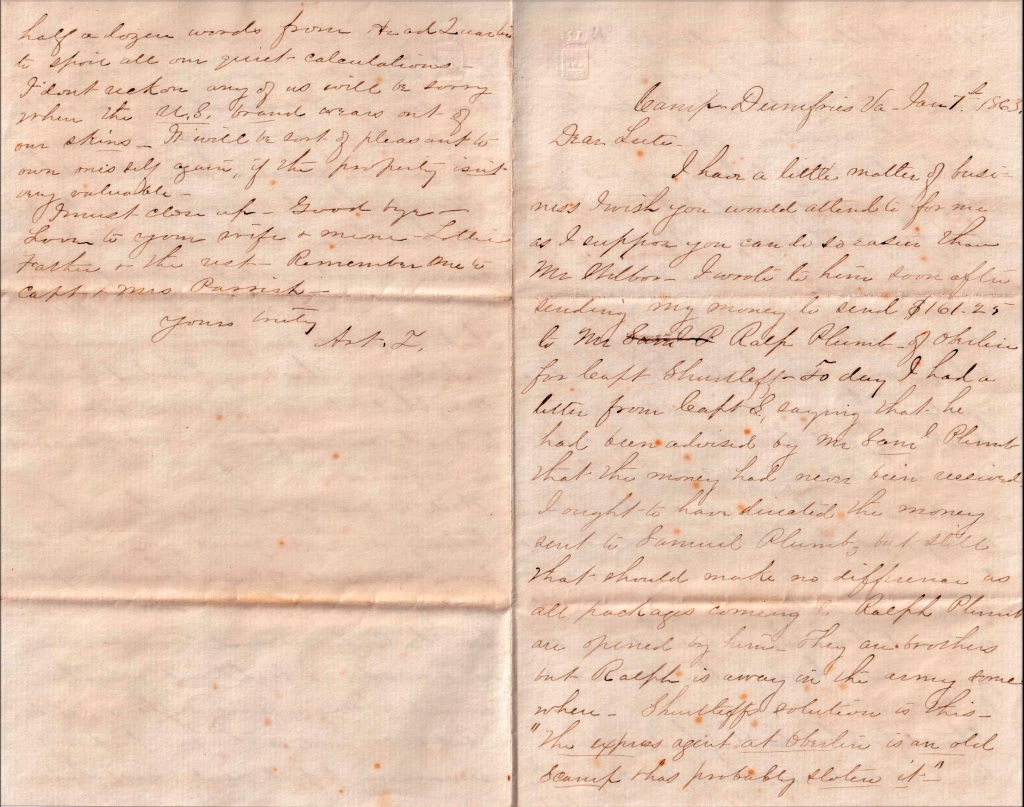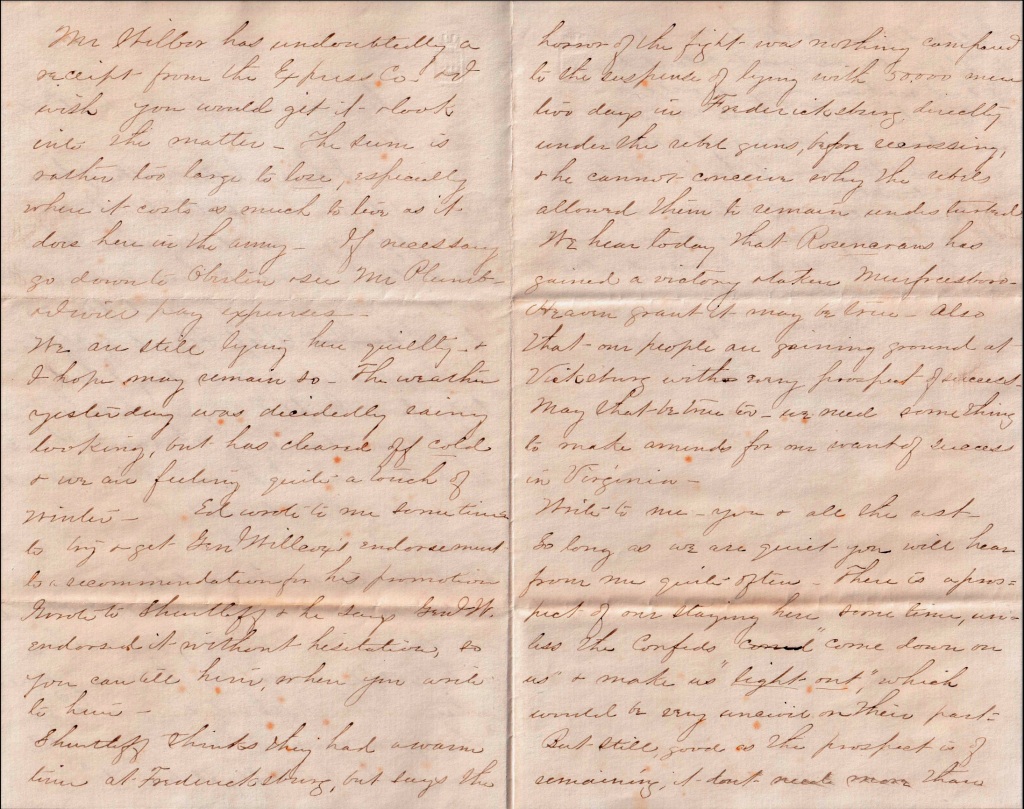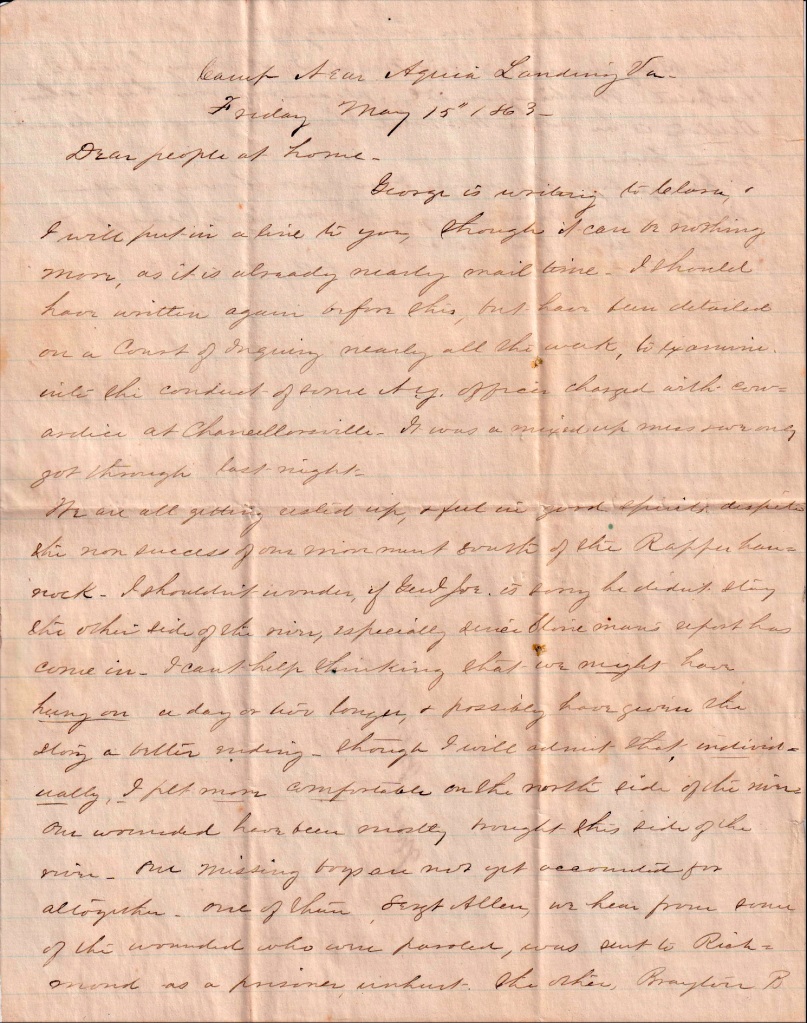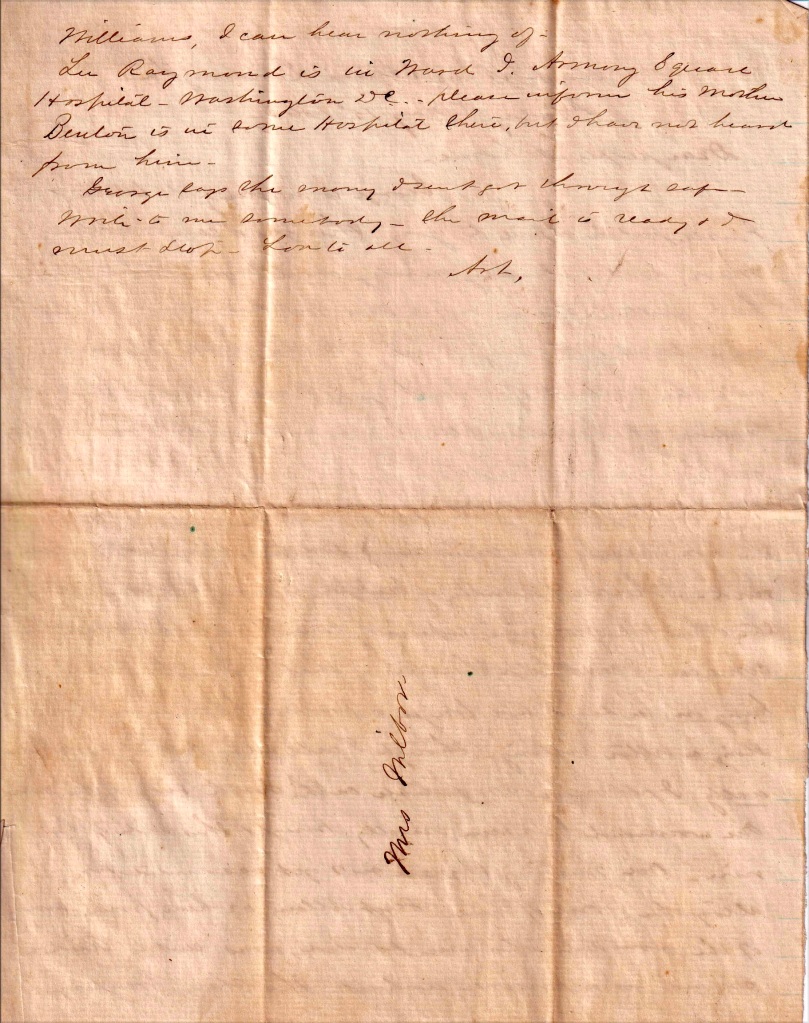The following letters were written by Frederick A. Seymour (1819-1903). He had Militia experience before the war and in 1860 was a 40 year old potter in Ravenna, Portage County, Ohio. He was commissioned Captain of Company G, 7th Ohio Volunteer Infantry for 3 months service on 23 April 1861 and mustered out with them on 14 June. He was appointed Captain of the same company for a 3 year term on 14 June 1861. He assumed command of the regiment at Antietam after the next senior officer, Major Crane, took charge of the Tyndale’s Brigade. He resigned his commission on 17 April 1863. He reenrolled as Major of the 7th Ohio Infantry on 13 August 1863 but again resigned, on 29 March 1864.
In 1870 he was a farmer in West Hartford, CT. By 1900 he had retired there. He married Elvira Curtis (1834-) in February 1852 and they had a son Nathan.
To read a similar letter by Frederick written home after the battle of Antietam, see Dan Master’s Civil War Chronicles of September 22, 2017 for a post entitled: “The 7th Ohio Infantry at the Battle of Antietam.” The 7th Ohio Infantry served in Tyndale’s 1st Brigade, Greene’s 2nd Division, of Mansfield’s XII Corps at the Battle of Antietam.
Frederick wrote these letters to 39 year-old Howard Battin (1826-1882), a railroad conductor, who also kept a boarding house in Millersburg, Holmes county, Ohio.
Letter 1
[Editor’s Note: This letter describes the August 9, 1862, Battle of Cedar Mountain (or Slaughter’s Mountain, or Cedar Run) in which the 7th OVI participated and during which Colonel William R. Creighton was severely wounded, after which Major Orrin J. Crane assumed command. The regiment was at the front and engaged in a fierce hand-to-hand conflict. Of the three hundred men engaged, only one hundred escaped unhurt. The Seventh OVI suffered more than any other Union regiment in this battle.]

Camp near Culpeper
August 14, 1862
I write this morning to let you know that I am still able to be around. For the last eight days if I had been at home, I should not have been able to be up at all but I felt better yesterday. I am so weak that I cannot walk half a mile. The morning of the fight I was terrible sick. I could keep nothing on my stomach a minute. We did not expect a fight that day. We had marched all night and got the order to make ourselves comfortable for the day. I had to ride in the ambulance. That night I was so sick I could not sit up. We had just got laid to rest for the day as we supposed when came the order bring up the troops. We were seven miles from Cedar Creek. The Rebels had driven in our pickets.

[When] we started, Col. [William R.] Creighton told me not to go but I thought I could ride in the ambulance till I got there, then I could stand it awhile. On the way there we had a great many men fall from sun stroke. It was a terrible hot day. Four of my men gave out by the way & could not go at all. When we came up, I went into the field after our men, had to walk half a mile. Had there but a few moments till the shells begin to come like hail around us. We were ordered forward. On we went to the top of the hill. Then they were to go double quick. I went as far as I could [but] had to fall out. I could not go farther. I sit down on the ground. Col. Creighton told me to go back before I got so far I could not get back. I sit and watched them till i could not stay there for the shells tore the ground all around me. Then I tried to get back over the hill. As I was going back, a horseman ran over me & nearly killed me. He was scared almost to death. I sit & watched the Boys till my heart sickened at the sight. They were cut like grass before the scythe. Our little regiment all alone to fight such terrible odds. For a good many minutes, the 7th [OVI] were alone & a great while Tyler’s old regiment was all alone with fifty thousand troops behind us and none to help us. It was so hard.
But enough. I hope I will get better for I have no one to help me now but Sergt. Dean all our book[s] to make out. I cannot leave now if I can sit up at all. I have tried to get my resignation papers ready but cannot get it done. All are so busy in care of our wounded. But if I am no better, I must leave for I cannot be up much longer. It seems hard to leave now when they are making such efforts to raise troops. I don’t know what is my duty to do. I cannot feel as though it was right to stay & not be able to get around. I shall do my duty if I know what it is. — Frederick

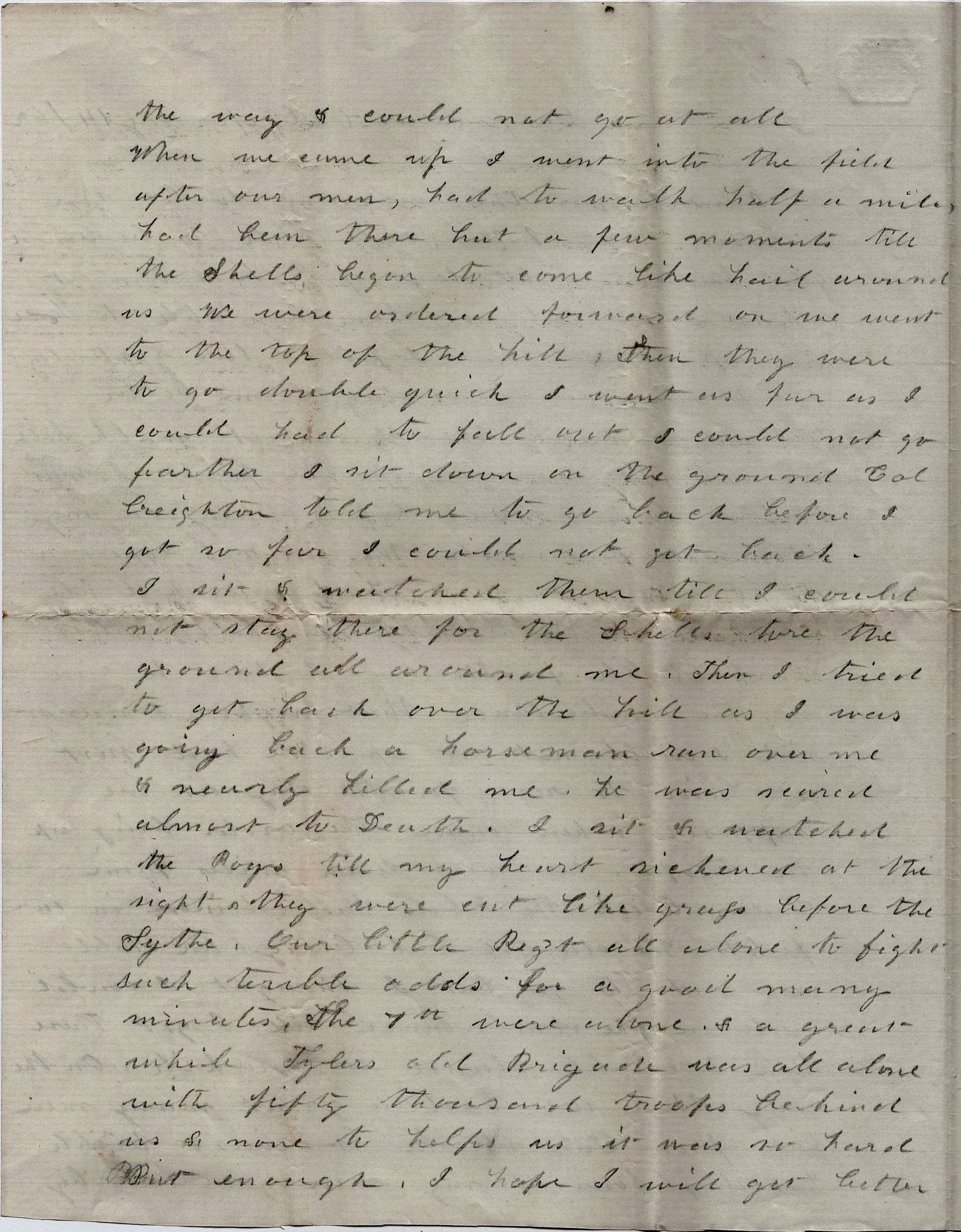

Letter 2

Harpers Ferry or Maryland Heights
September 21st 1862
This is the first time for ten days I have had time to write you. I wrote Rube the night of the Battle. I left Washington as I wrote you from Rockville, Maryland, & have been marching all the time since then, days and some nights all night. Then lay down without a blanket for our teams were back out of the way. When we reached Frederick City the Rebels left there without much of a fight. We left Frederick on Sunday the 14th. All the time from the 13th to the 15th [there was] terrible fighting on the mountains between Frederick City and Hagerstown. Our troops drove them out of the mountain with a terrible slaughter although they had a strong position. Gen. Cox made a good fight. His men did well for the first time they were under fire. The mountain roads were strewn with their dead. We followed as close as we could get for the size of our army, our right [wing] fighting them all the way for five days before we came up.

On Wednesday the 17th we came up with them after marching all night, sire and tired. At four they opened on us and drove our men back half a mile on the right of the line which extended four or five miles. At five Gen. [George S.] Greene’s Division in which was our regiment, was ordered up to the front. At about six, we were engaged from that time till 3 in the afternoon. We were in the hottest of the fight in the center of the line. Such terrible fighting was never seen. The Rebels fought with a desperation worthy a better cause. They were bold and perfectly reckless. Our boys fought with determined energy that has ever characterized the 7th [Ohio] Regiment. [Maj. Orrin J.] Crane was commanding the regiment. I acted as Major. I had command of the regiment for a week but Crane came up in time for the fight. I would liked to have had our boys in the fight but it is all right, I suppose.
In the afternoon, Gen. Greene ordered us back to rest as we had run out of ammunition. We fell back onto a field to rest and they brought up fresh troops. We had a great many troops not engaged. When we fell back, Crane went off. Then came the order to the front again. I led the boys up but as fortune for our weary boys, they did not have to fight again that night but lay on our arms all night ready for the fight in the morning which the darkness had stopped.
In the morning artillery and skirmishing commenced at break of day. I was detailed to bury the dead of our regiment. I took eight men and went to the front and found our pickets and sharpshooters hard at work but I was bound to find our men which I did after a great deal of trouble. After one man—Corporal [Martin] Lazarus—fell, I went back under fire to see if he was alive and hear what he had to say, but poor fellow was dead before I could get back to him. By his side I found H. L. [J. B.] Carter of Co. F. He too was dead. I took their blankets off them and rolled them up and had to leave them for shot and shell came thick around me. In the night they were taken away but after long search, I found them, took our stretchers, carried them half a mile to a burying ground & gave them a soldier’s burial. I placed a board at the head plainly marked so at any time their remains can be obtained. After cold weather, it would be utterly impossible to get them now. I did all I could for them. They were decently buried in a church yard. I had none but him killed, 9 wounded, some of them badly, but another such a scene as that battlefield—may God spare me the sight at which the heart grows sick & shudders at the terrible sight.
As we marched over the bloody field on our way here on the ground on which our Regiment—the 7th [Ohio]—were engaged, more than 2,000 dead Rebels in less than a mile in all conceivable forms possible to think of festering and decaying in the sun as the Rebels fled and left them unburied. I can give no description nor can any person picture the horrid scene. They lie in countless numbers for miles around. But they have left Maryland & gone to Virginia again. Where we will go now is not known but I presume we will have to chase them up the Valley again. Gen. McClellan was with or near us all the time. The boys gave cheer upon cheer as he passed us. Our own General in the fight was wounded. As he passed us, he paid us a high compliment. He said he would see we had justice done us but he was severely wounded and probably will not live. But God’s will be done.
We have lost some good officers. Gens. [Joseph K.] Mansfield & [Jesse] Reno & others of lesser rank. Our wounded are numerous but not so many killed as one would suppose for so bloody a battle for the estimation of army men, it was the great battle. Oh may I never be called on to go through another such a day. I am nearly worn out marching all day, lying on the ground nights without so much as a blanket, but God will protect and he has kindly preserved me thus far. He will do all things right. — Frederick

